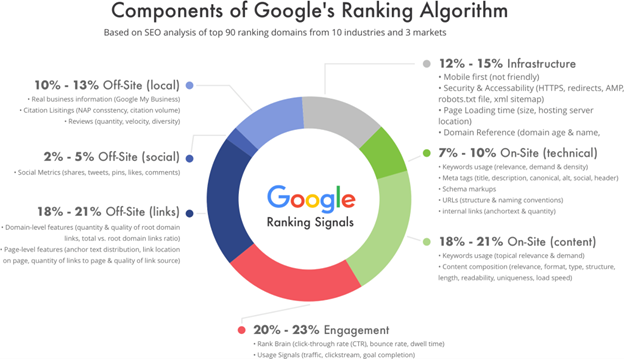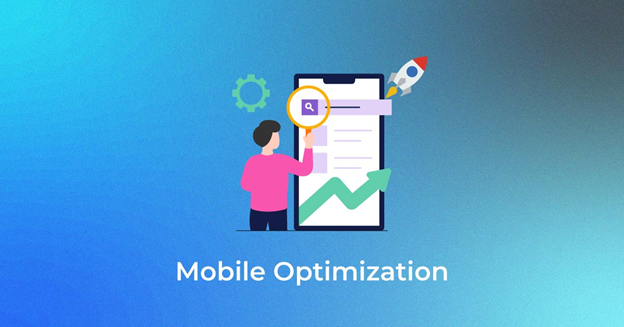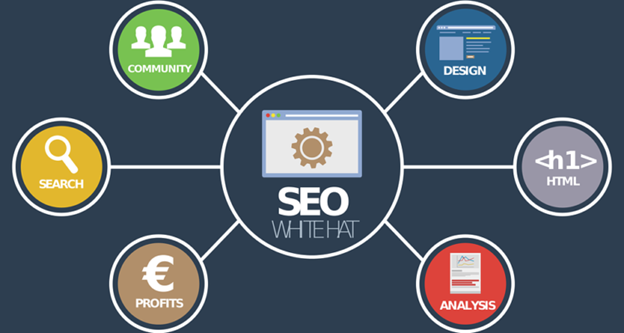SHARE

In the competitive world of online marketing, securing a spot on the first page of Google search results is crucial for businesses looking to attract organic traffic and increase their online presence. Achieving this coveted position is a challenging feat and requires a deep understanding of Google’s complex ranking algorithm. In this article, we will explore the key factors that influence Google rankings and provide you with actionable strategies to improve your website’s visibility.
Understanding Google’s Ranking Algorithm
Google’s ranking algorithm is a sophisticated system that assesses and ranks billions of web pages based on various factors. One of the primary elements Google considers is the strategic use of keywords throughout your website’s content. Your choice of keywords should align with what your target audience is searching for and be seamlessly integrated into your site’s copy. When it comes to keywords, it’s not just about using them abundantly but also understanding their relevance and context. Google’s algorithm has evolved to recognise the intent behind a user’s search and deliver the most relevant results. Therefore, thorough keyword research is essential to identifying the terms and phrases that resonate with your audience.
Another crucial aspect of Google’s algorithm is backlinks. Backlinks are links from other websites that direct users to your site. Google views backlinks as a vote of confidence from other reputable sites. The more high-quality backlinks pointing to your website, the more Google recognises its credibility and boosts its ranking.
Building a strong backlink profile requires a proactive approach. Engaging in outreach campaigns, collaborating with influencers, and creating exceptional content that naturally attracts links are some effective strategies to acquire valuable backlinks. It’s important to note that quality matters more than quantity when it comes to backlinks. A few authoritative and relevant backlinks can have a more significant impact than numerous low-quality ones.
Furthermore, Google places great emphasis on the quality of content. Gone are the days of keyword stuffing. Instead, Google rewards websites that provide valuable, informative, and engaging content that fulfils users’ search intent.Crafting well-written, relevant, and comprehensive articles will significantly improve your Google rankings.
When creating content, it’s crucial to understand your target audience’s needs and preferences. Conducting surveys, analysing user behaviour data, and monitoring industry trends can help you gain insights into the topics and formats that resonate with your audience. Addressing their pain points and providing solutions can establish your website as a valuable resource and attract organic traffic.
Moreover, user experience plays a vital role in Google’s ranking algorithm. Websites that offer seamless navigation, fast loading times, and mobile responsiveness are more likely to rank higher. Optimising your website’s design and structure, improving page speed, and ensuring compatibility across different devices are essential steps to enhance the user experience and improve your search engine rankings.
In addition to these factors, Google also considers social signals, such as likes, shares, and comments, as indicators of a website’s popularity and relevance. Engaging with your audience on social media platforms, encouraging social sharing, and fostering a sense of community can help amplify your online presence and potentially boost your rankings.
It’s important to note that Google’s ranking algorithm is constantly evolving. The search engine giant regularly updates its algorithms to provide users with the best possible search experience. Staying up-to-date with the latest algorithm changes and adapting your SEO strategies accordingly is crucial to maintaining and improving your website’s visibility in search results.
Optimising your Website for Google rankings
Now that we have discussed the key factors that influence Google rankings let’s delve into specific strategies to optimise your website:
The Significance of Meta Tags and Descriptions
Meta tags and descriptions are HTML elements that provide information about your webpage to search engines. These snippets of text appear in search results, giving users a brief overview of your content. Including relevant keywords in your meta tags and descriptions helps Google understand what your page is about and improves its visibility in search results. When crafting your meta tags and descriptions, it’s essential to strike a balance between being informative and enticing. You want to provide enough information to entice users to click on your website while also incorporating keywords that align with their search queries. This delicate balance can significantly impact your click-through rates and ultimately improve your rankings.
Additionally, it’s worth mentioning that meta tags and descriptions are not just for search engines. They also play a crucial role in improving the accessibility of your website. Screen readers and other assistive technologies rely on these elements to provide users with a better understanding of your content.
The Impact of Website Speed on Google Rankings
In today’s fast-paced digital landscape, website speed is of paramount importance. Google prioritises user experience, and a slow-loading website can significantly impact your rankings. When a website takes too long to load, users are more likely to abandon it and look for alternatives.
One key factor affecting website speed is the size of your images. Large, uncompressed images can significantly slow down your website. To optimise your site for speed, it’s crucial to compress your images without compromising their quality. Various tools, such as image compression plugins or online image optimisation services, can help you achieve this.
In addition to image compression, minimising HTTP requests can contribute to faster loading times. Each element on your webpage, such as images, scripts, and stylesheets, requires an HTTP request to load. By reducing the number of these requests, you can improve your website’s overall speed.
Another effective strategy to enhance website speed is leveraging browser caching. When a user visits your website, their browser stores certain files, such as images and scripts, in its cache. This allows subsequent visits to your site to load faster, as the browser can retrieve these files from the cache instead of making new requests to the server.
Mobile optimisation: A necessity for modern SEO
With the rise of mobile devices, having a mobile-friendly website is crucial. Google gives preference to mobile-optimised websites, as they provide a better user experience. In fact, Google has implemented mobile-first indexing, meaning it primarily considers the mobile version of your site for indexing and ranking.
When optimising your website for mobile, it’s important to ensure that it is responsive. A responsive design allows your site to adapt to different screen sizes and orientations, providing a seamless experience across various devices. This not only improves your rankings but also enhances user satisfaction and engagement.
In addition to responsiveness, fast loading times are also crucial for mobile optimisation. Mobile users often have limited data plans and slower internet connections, so it’s essential to minimise the size of your files and optimise your code to ensure swift loading on mobile devices.
Furthermore, seamless navigation is key to a mobile-friendly website. Users should be able to easily navigate through your site, access important information, and complete desired actions, such as making a purchase or filling out a contact form. Intuitive navigation not only improves user experience but also increases the likelihood of conversions.
By prioritising mobile optimisation, you can not only improve your Google rankings but also cater to the growing number of mobile users, ensuring that your website remains competitive in the ever-evolving digital landscape.
Developing a Strong SEO Strategy
Improving your Google rankings requires a well-rounded SEO strategy. Here are key areas to focus on:
Keyword research: Finding the Right Terms to Target
Thorough keyword research is the foundation of any successful SEO strategy. Use tools like Google Keyword Planner to identify high-volume, low-competition keywords relevant to your business. Incorporate these keywords naturally into your website’s content to increase your chances of ranking higher.
Building Quality Backlinks: Strategies and Techniques
While the number of backlinks is important, quality is paramount. Guest posting, influencer outreach, and creating share-worthy content are some ways to seek opportunities to gain backlinks from authoritative websites in your industry. Quality backlinks will boost your ranking and establish your website as a trusted source of information.
Creating Engaging, SEO-Friendly Content
Content remains king in the realm of SEO. Write high-quality, informative articles that address your target audience’s pain points. Use relevant keywords naturally, and ensure your content is shareable across social media platforms. Engage your readers with visually appealing images and interactive elements to keep them coming back for more.
[thrive_leads id=’8310′]
Monitoring your Google Ranking Progress
Your journey to the first page of Google is an ongoing process, and it’s essential to monitor your progress to gauge your website’s performance. Here are some tools and metrics to help you track and optimise your ranking:
Tools for Tracking your Website’s Google Ranking
Utilise tools like Google Search Console, SEMrush, and Ahrefs to monitor your website’s position in search results. These tools provide valuable insights into keyword rankings, organic traffic, and competitor analysis, allowing you to make data-driven decisions for your SEO strategy.
Understanding Google Analytics: Key Metrics to Monitor
Google Analytics is a powerful tool for understanding user behaviour on your website. Pay attention to metrics such as bounce rate, time on page, and conversion rate. These metrics can help you identify areas for improvement and tailor your content to better meet the needs of your audience.
Making Adjustments: How to Improve your Ranking Over Time
SEO is an iterative process, and continuous improvement is crucial. Regularly analyse your website’s performance, identify any weak areas or gaps in your content, and make the necessary adjustments. Stay up-to-date with the ever-evolving world of SEO to ensure your website remains competitive.
In conclusion, achieving first-page rankings on Google requires a comprehensive understanding of the search engine’s complex algorithm and a well-executed SEO strategy. By optimising your website, focusing on relevant keywords, building quality backlinks, creating engaging content, and continuously monitoring and adjusting your approach, you can increase your chances of reaching the top. Remember, patience and persistence are key in this ever-changing digital landscape. Good luck!
[thrive_leads id=’3540′]
Frequently Asked Questions About Google Rankings
How long does it take to get a First Page Google Ranking?
How Important is it to be on the First Page of Google?
75% of people will never scroll past the first page on a Google search. A recent study shows that the first organic result in Google Search has an average click-through rate of 28.5%. Ranking on the first page of search results equals more CTR and organic traffic.
How does Google Rank Your Page?
What are the Benefits of having a High Google Page Rank?
















